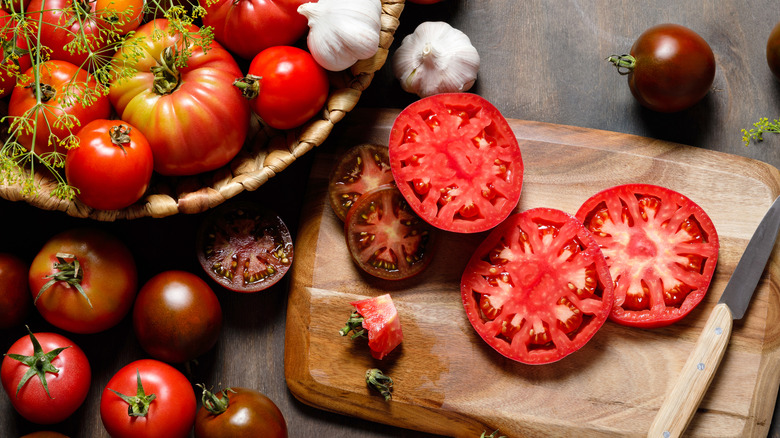Here's Why You Should Consider Eating More Tomatoes
Tomatoes are a common food found in supermarkets, restaurants, farmers' markets, and home kitchens. You can make a variety of recipes from this red, juicy produce, including hearty sauces, like marinara or tikka masala, tomato salad, and toasted tomato sandwiches. There are green tomatoes, which can be eaten raw, fried, or used in casseroles and relish recipes. Tomatoes also pair beautifully with many other foods, ingredients, and dishes, from pasta recipes to raw vegetable and fruit platters (via Epicurious). They are so widely used that it's almost impossible to look at any restaurant menu and not see at least one tomato dish.
As Food Revolution notes, the popularity of the tomato wasn't always the case as they were actually feared and avoided until the 1800s or so, due to their connection to the nightshade family and the plants believed toxic properties. However, presently tomatoes come in second to potatoes as the most eaten vegetable — or should we say fruit?
What are the health benefits of tomatoes?
Health reports that yes, tomato is indeed a fruit because it's "seed-bearing and develops from the ovary of a flowering plant." Nutritionally and culinarily speaking, and according to a Supreme Court ruling, the tomato is actually a vegetable. The discourse over whether the tomato is a fruit or a vegetable can sometimes overshadow its health benefits, which are plenty.
Epicurious reports that tomatoes are "nutritional powerhouses," containing antioxidants, vitamin C, vitamin A, lycopene, dietary fiber, potassium, vitamin K, vitamin E, niacin, magnesium, and more. One cup of cherry tomatoes, for example, has 32% of the daily recommended value of vitamin C and is packed with other nutrients.
Lycopene is the trademark nutrient in tomatoes, which has been said to mitigate inflammation, support skin and eye health, and promote anti-cancer properties (per Health). Interestingly, lycopene is absorbed even more when paired with healthy fats making sliced tomato with olive oil and mozzarella a good choice, both from a flavor and health perspective. Crushing or pureeing tomatoes for recipes like sauce can also help to boost lycopene absorption (via Eat This, Not That!).
Are there any drawbacks to eating tomatoes?
The lycopene in tomatoes can help promote bone health, minimize skin bruising, lower blood pressure, and lower cholesterol. Livestrong states that tomatoes — both raw and cooked — also promote serotonin production and may aid in weight loss and Good Housekeeping notes that tomatoes are also helpful in minimizing the effects of diabetes.
So what was it in the past that people feared over this clearly healthy food choice? Tomatoes are a part of the "nightshade" plant family, as are eggplants and peppers. Per Healthline, these nightshades contain alkaloids, which might contribute to irritable bowel syndrome symptoms. Some people also believe that eating nightshades can worsen the symptoms of autoimmune diseases, however, there is not enough research to say for certain.
While the nightshade theories require further research, there is a true downside for some that eat tomatoes. Vanguard Gastroenterology states that tomatoes are a no-no for those living with GERD or acid reflux as the acid can worsen symptoms.


